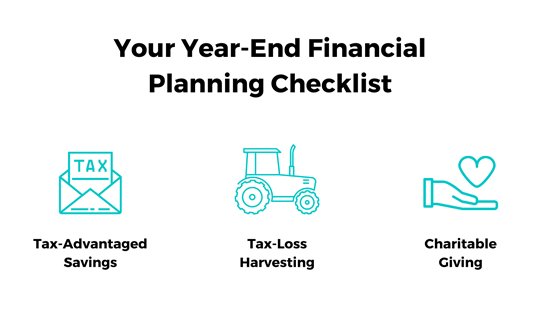Time to Read: 5 Minutes
As the holiday season gears up, there are some things you should check off your wealth planning to-do list so you can preserve more of what you made and get ahead for the new year. Strong financial health isn’t just about the right investments, it’s about strategic planning around taxes and thinking through the long-term implications of the moves you can make now. We broke down end of year planning to-do’s so you can focus more on holiday feasts and cheers-ing.

Maximizing Tax-Advantaged Savings
401(k) Accounts
The maximum you can put into a 401(k) account in 2021 is $19,500 if you’re under 50 and an additional $6,500 for those 50 and above. With just a few pay periods left in the year, it may be worth it to up your contributions and put in as much as you can afford. You’ll pay less in taxes this year, and you’ll have another year of growth of the plan. If you haven’t contributed at least enough into your plan to get the company match, it’s important that you do that. Otherwise, you’re just leaving money on the table that could come in very handy during retirement.
High earners oftentimes find 401(k) savings limits low, relative to their income and saving capacity. There’s an extremely productive strategy that can turn your 401(k) into a vehicle for saving above the income limits and creating tax-free distributions later. It’s called the Mega Backdoor Roth 401(k). Read more about this strategy here.
Health Savings Accounts (HSAs)
The number of tax-savings strategies available to affluent investors and high-income earners continues to shrink—but Health Savings Accounts (HSAs) are a noteworthy exception to this trend. Often overlooked or misunderstood, HSAs can be a great tool when used correctly. An HSA can create an easy annual income tax deduction and a dedicated, tax-free bucket of funds to cover healthcare costs during retirement.
HSAs were created to be used alongside High Deductible Health Plans (HDHPs). For 2021, the IRS defines a high deductible health plan as any plan with a deductible of at least $1,400 for an individual or $2,800 for a family.
They allow you to save and invest money to be used for medical expenses, including deductibles, co-insurance, prescriptions, vision expenses, and dental care. Unused balances are carried over to the following year, funds never expire, and they can be passed on to a surviving beneficiary. In addition, HSAs are “triple tax-advantaged”, meaning that they are funded with pre-tax dollars, they grow tax-free, and withdrawals are not taxed if they are spent on qualified medical expenses. For 2021, individuals can contribute $3,600 and families can contribute $7,200.
Education Savings Plans
529 plans are tax-advantaged savings plans specifically designed to help parents pay for their child’s education (although, they can be used by more than just parents). 529 plans are not just for college – tax-free withdrawals may also include up to $10,000 per year in tuition expenses for K-12 schools. State tax treatment of K-12 withdrawals vary.
Although contributions are not deductible at the federal level, earnings grow federal tax-free and there is no federal tax on withdrawals to pay for qualified withdrawals. Depending on your state, you may be able to deduct contributions from your state taxes. You can contribute up to $15,000 per year per individual, or you can put in up to five years’ worth of contributions all at once and really get things going and (hopefully) growing.
While many investors open 529 plans because they recognize how higher education opens doors to future income and opportunities for their children. Why stop there? Why not provide a lasting legacy of educational support for nieces, nephews, and future generations? In addition to being excellent college savings accounts, 529 plans have unique qualities making them shrewd estate planning vehicles. Read more about Dynasty 529 plans and strategies for high-net-worth investors here.
Tax-Loss Harvesting
Scouring your investment statement looking for losses – with a positive frame of mind – is definitely not the usual. But in a year with big market gains, those losses can offset your capital gains as you rebalance your portfolio back to your preferred risk tolerance or just reset for next year. In a year where tax proposals are circling, tax loss harvesting is as important as ever.
Charitable Giving
The increase in asset values this year not only makes charitable giving more attractive, if you do it by gifting an appreciated stock directly from your account, you won’t have to pay capital gains but you will get the full market value of the gift as a tax deduction.
Those over age 70 1/2 (or age 72 if turning 70½ on or after January 1, 2020) can use a qualified charitable distribution strategy that allows donations of up to $100,000 directly to a charity from an IRA instead of taking RMDs. This can help reduce taxes because you avoid taking income, which could mean staying in a lower tax bracket, and potentially lowering the amount of RMDs in future years.

